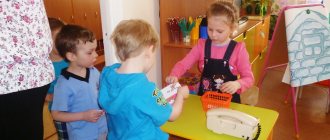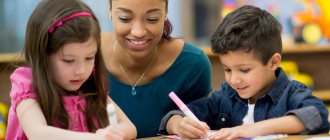Social and personal development
Social and personal development is the process and result of two interconnected and interdependent processes: socialization and interiorization, which are aimed at the child’s entry into the sociocultural environment.
Interiorization is a process as a result of which a child acquires new personality traits, drawing them from social reality, the process of becoming social into individual (L.S. Vygotsky).
Currently, special attention is paid to the problem of social and personal development and education of preschool children, which is one of the components of the draft State Standard for Preschool Education. Increased attention to the problems of socialization is associated with changes in socio-political and socio-economic living conditions, with instability in society. In the current situation of an acute lack of culture of communication, kindness and attention to each other, teachers experience difficulties in preventing and correcting such negative manifestations of children as rudeness, emotional deafness, hostility, etc. The need for a detailed and in-depth study of the problem is also dictated by the established practice of preschool educational institutions and the relevance of developing programs and methods for using modern technologies for the social and personal development of preschool children.
The problem of inclusion in the social world has always been and now remains one of the leading ones in the process of forming a child’s personality. Historical analysis convinces of the need to provide a child with qualified assistance in the complex process of entering the human world. The socialization of a preschooler involves the development of the ability to adequately navigate the social environment available to him, to realize the intrinsic value of his own personality and other people, to express feelings and attitudes towards the world in accordance with the cultural traditions of society.
The draft standard for preschool education, defining the mandatory minimum content of the program implemented in a preschool educational institution, puts forward a number of requirements for the social and personal development of its pupils. These requirements include:
— development of a child’s positive attitude towards himself, other people, the world around him, children’s communicative and social competence;
- creating conditions for the child to develop a positive sense of self - confidence in his abilities, that he is good, that he is loved;
- formation in the child of self-esteem, awareness of his rights and freedoms (the right to have his own opinion, choose friends, toys, activities, have personal belongings, use personal time at his own discretion);
- nurturing a child’s positive attitude towards people around him - respect and tolerance for children and adults, regardless of social origin, race and nationality, language, religion, gender, age, personal and behavioral identity, respect for the self-esteem of other people, their opinions, desires, views;
- introducing children to the values of cooperation with other people: providing assistance in recognizing the need of people for each other, planning joint work, subordination and control of their desires, coordinating opinions and actions with partners in activities;
- developing in children a sense of responsibility for another person, a common cause, a given word;
- creating the child’s communicative competence - recognizing the emotional experiences and states of others, expressing one’s own experiences;
- developing social skills in children: mastering various ways to resolve conflict situations, the ability to negotiate, take turns, and establish new contacts.
A large role in the successful social and personal development of preschoolers is played by a team of like-minded people, which is formed from the kindergarten administration, teachers, educational psychologist, physical education instructor, and music directors. Educators form children's ideas about the social world, about themselves, the people around them, nature and the man-made world, and cultivate social feelings and an active life position. Musical directors help in creating dramatizations, playing out situations using scenery and costumes. A teacher-psychologist works with children to master the language of emotions and correct aggressiveness; formation of self-confidence, social skills, moral consciousness.
In order to ensure social partnership between the preschool educational institution and the family, it is necessary to pay great attention to working with parents. To ensure close interaction between teachers and parents in the social and personal direction of working with children, it is necessary to draw up a plan for working with parents in this direction, and to familiarize parents with the work of the kindergarten, use parent meetings, consultations, open classes, joint holidays, registration in the “Parents Corner” " and etc.
Pedagogical approach to introducing a child into society
The teacher in the pedagogical process assigns an important place to the formation of the child’s internal activity, which ensures his socialization, independence and initiative.
For children of the fourth year of life, situations with toy characters were selected, for children 5–6 years old, real characters were used. They usually start with situations that are less emotionally intense, gradually moving on to more complex ones.
Particular attention is paid to practical methods of developing social experience, skills of communication culture and interaction with adults and peers, and the active use of life situations.
If there is no proposal on the part of the children to solve the problem, its solution should be proposed by the teacher, who, together with the children, summarizes the children’s statements and sums it up.
The personal example of the teacher and the organization of joint actions of children help to accumulate positive social experience and socialize the child.
For older children, practical situations of a problematic nature are used as a type of complicated situations, which are used to stimulate activity, initiative, independence, sensitivity, and readiness to find the right solution.
An adult is a source of various information about the rules of community life, behavioral characteristics in society, cause-and-effect relationships between manifestations of moral activity and the attitude of others.
Means, methods, techniques for the social and personal development of children in preschool educational institutions
The implementation of the tasks of social development of preschool children is most effective in the presence of an integral pedagogical system, built in accordance with the basic approaches of the general scientific level of pedagogical methodology.
· The axeological approach allows us to determine a set of priority values in education, upbringing and self-development of a person. In relation to the social development of preschool children, these can be the values of communicative, psychosexual, national, ethnic, and legal culture.
· The cultural approach allows one to take into account all the conditions of the place and time in which a person was born and lives, the specifics of his immediate environment and the historical past of his country, city, and the basic value orientations of representatives of his people and ethnic group. The dialogue of cultures, which is one of the dominant paradigms of the modern education system, is impossible without familiarization with the values of one’s culture.
· The humanistic approach presupposes recognition of the personal beginning in the child, orientation towards his subjective needs and interests, recognition of his rights and freedoms, the intrinsic value of childhood as the basis of mental development, the cultural creative function of childhood as one of the most important aspects of social development, psychological comfort and the welfare of the child as priority criteria in assessing the activities of social institutions.
· The anthropological approach makes it possible to increase the status of psychological and pedagogical diagnostics in determining the dynamics of social development of preschool children, to take into account various (age, gender, national) features of personal development in the process of moral, sexual, patriotic, international, and legal education.
· The synergetic approach allows us to consider each subject of the pedagogical process (children, teachers, parents) as self-developing subsystems that make the transition from development to self-development. In terms of the social development of children, this approach provides, for example, a gradual change in the general orientations of the teacher in the formation of basic types of activity (from perception - to reproduction according to a model - to independent reproduction - to creativity).
· The multi-subject approach presupposes the need to take into account the influence of all factors of social development (microfactors: family, peers, kindergarten, school, etc.; mesofactors: ethnocultural conditions, climate; macrofactors: society, state, planet, space).
· The systemic-structural approach involves organizing work on the social development of preschool children in accordance with an integral pedagogical system of interrelated and interdependent goals, objectives, content, means, methods, forms of organization, conditions and results of interaction between teachers and children.
· An integrated approach involves the interconnection of all structural components of the pedagogical system in relation to all links and participants in the pedagogical process. The content of social development includes the child’s orientation in the phenomena of social and personal life, in himself.
· The activity approach allows us to determine the dominant relationship between the child and the outside world, to actualize the fulfillment of the needs for self-awareness as a subject of activity. Social development is carried out in the process of significant, motivated types of activity, a special place among which is occupied by play, as an activity in itself that provides a feeling of freedom, subordination of things, actions, relationships, allowing one to most fully realize oneself “here and now”, achieve a state of emotional comfort, become involved in a children's society built on free communication of equals.
· The environmental approach allows us to solve the problem of organizing the educational space as a means of social development of the individual. The environment is a set of niches and elements, among which and in interaction with which children’s lives take place. A niche is a certain space of possibilities that allows children to satisfy their needs. Conventionally, they can be divided into natural, social, and cultural. In relation to the tasks of social development, the organization of educational space requires the creation of a subject-development environment that ensures the most effective introduction of children to the standards of culture (universal, traditional, regional). The element is an unconstrained force acting in the natural and social environment in the form of various social movements, manifested in moods, needs, and attitudes. In relation to the social development plan, the element will be found in the interaction between children and adults, in the dominant value orientations, in the hierarchy of goals in relation to the ranking of educational tasks.
Team support
The team not only fully supports behavior that corresponds to the norms of the adult environment, but also ensures that each of its members does not show indifference to others and feels involved in common problems.
By uniting in groups, children organize games during which they practice the ability to fairly distribute roles, negotiate, share toys, give in, and restrain emotions.
In the process of joint activities, the preschooler learns the norms of the hostel, mandatory for all participants in the children's group, and learns to be himself among others.
Every child simply needs to have a sense of belonging to a certain group. He must clearly know that he has a group of people to rely on, where he will always be listened to carefully and understood.
A sense of belonging is the feeling of being understood and accepted.
There is a need to socialize, form and strengthen your support group, because you can share your thoughts with it, and also, it gives feedback. After all, when such a group is formed at an early age, the child has significantly fewer problems during adolescence.
A child needs to feel like a part of something, a member of a family, a group, a team, because, first, through small things, namely, attachment to a team, a group, a sense of pride in the country, nation is formed.
A sense of belonging is a feeling of exclusivity or relatedness, especially in relationships that are considered important, a feeling of approval and respect from others.
This feeling increases the possibilities for improving friendships.
Therefore, it is necessary to create such a program, one of the main tasks of which would be to instill a sense of belonging to a certain group in preschool children.
Practical situations of humanistic choice.
Preschoolers are faced with a choice : respond to the problems of other children or prefer personal interests and show indifference?
For example, keep the drawing for yourself or include it in a general message to a sick peer; respond to a request for help or ignore it?
The behavior of children in situations of choice helps to better understand the characteristics of their social, moral and emotional development.
2. Practical situations of a problematic nature such as “What to do, what to do?” personality behavior education preschool
These are various difficult situations that we create in order to awaken children’s initiative, independence, intelligence, responsiveness, and willingness to look for the right solutions.
Situations: there are no paints of certain colors, there is not enough plasticine for modeling. Children independently look for solutions and solve problems together.
3. Practical situations “We are the oldest in kindergarten .”
Children learn to take care of children, they develop a sense of self-esteem, a kind attitude towards little ones, and an understanding of their problems.
You can organize the situations “We will delight the kids with gifts made by ourselves”, “We will prepare a concert for the kids”, “We will show a fairy tale”, “We will help make a snow slide”, “We will teach the kids how to dance in circles”.
4. The following situations are like “We are friends with schoolchildren.”
Senior preschoolers gain experience in collaborating with school students: “We are having a sports festival,” “Joint literary quiz in the library,” “We are waiting for our teachers.”
Participation in such situations deepens interest in school and relieves anxiety associated with upcoming schooling. At the same time, valuable experience of inter-age communication is formed, which is important not only for preschoolers, but also for students.
5. Children are very fascinated by situations like “Teach your friend what you can do yourself.”
We encourage children to show attention to each other, mutual assistance and cooperation. Children share their experiences, we help them enter the role of “teacher”, i.e. be patient, attentive and forgiving to the mistakes and difficulties of peers.
6. Children also participate in imitation games : changing emotional and physical states, imitating states of nature, etc.
I would like to emphasize that our constant assistant in the social and personal development of children is the family . Only in cooperation with close adults can high educational results be achieved.
Interaction with family is effective provided there is trust in each other, understanding and acceptance of common goals, methods and means of social and personal development.
It is necessary to instill in a child a love for those closest to him - his home and kindergarten. This is the basis of moral education, the first and important stage.
A child must first of all recognize himself as a member of the family, an integral part of his small homeland, then as a citizen of Russia, and only then as an inhabitant of planet Earth. We go from near to far.
Socialization of children from 3 to 7 years old
- Teach your child to talk about his desires calmly. Teach how to negotiate in controversial situations without conflict. To do this, speak calmly and confidently, do not raise your tone.
- It is important to set social boundaries by explaining what is and is not allowed. The concept of “you can’t” needs to be deciphered and an answer to the question “why isn’t it?” This will save the baby from checking the ban on himself.
- Teach your child to be attentive to others - create situations in which he can take care of his neighbor.
- Be respectful of your children's interests, hobbies and desires.
- It is useful to talk with an older preschooler and analyze his actions and the actions of others. Ask his opinion about why the person did what he did? What feelings motivated him? This teaches children to better understand others.
- Give your preschooler more independence.
- Encourage contact with other children and do not criticize friends. You can express disapproval of another child's actions, but you must give an objective explanation.
- For the socialization of a child, harmonious conditions for the child’s development in the family are necessary, but communication with peers is also necessary. Therefore, choose a good kindergarten and preschool center.
Children's invites your children to classes for preschoolers. Our children not only master intellectual and creative disciplines, but also learn to communicate and make new friends. For the little ones, we have an early development course, the important task of which is the adaptation and socialization of children. We invite older children to the discipline of comprehensive development. Here the child reveals his talent in choreography, acting, vocal classes, and also develops morally and spiritually in Sunday school.





